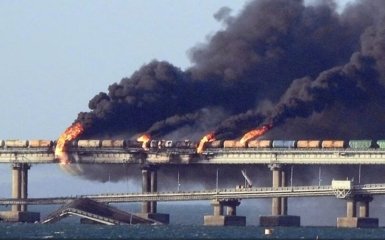The Russian Federation began using land routes in the occupied Crimea to support its troops in Ukraine after repeated attacks by the Armed Forces of Ukraine on the Kerch Bridge.
Russia does not carry military goods over the Crimean Bridge
Analysis of satellite images shows practically no traffic on the Kerch Bridge. Analysts believe that the bridge is no longer an effective military target for the ammunition-strapped Ukrainian forces.
The Independent publication and Molfar OSINT agency report this.
Images taken by satellite specialists Maxar, which were analysed by Molfar and sent to The Independent, show that almost no military freight trains have run on the bridge's rail line for three months.
During this period, on February 29, only one Russian freight train carrying about 55 wagons of fuel was seen on the bridge.
In March or April, according to analysts, there was no Russian military movement on the bridge.
Russia's use of the bridge was significantly reduced after Ukraine attacked it with drones on July 17, 2023, and blew up a section of the road and a railroad track, the analysis noted.
The decision to end the use of the Kerch bridge for the resupply of Russian troops is related to the surge in freight traffic through Taman in the Rostov region, Molfar CEO Artem Starosek told The Independent.
He believes that Kyiv should focus on Melitopol, Berdyansk and Mariupol, where Russia is building new railway lines to connect these occupied Ukrainian regions with Crimea and mainland Russia. The new railway line, which runs from Akymivka in Melitopol and stretches to Berdyansk and Mariupol before reaching Rostov in Russia, will likely be used by Russian forces for a new offensive.
The line, which includes 63 km of new track and about 140 km of rehabilitated track, was tested with its first freight train in March, Molfar said. It is expected to be completed by the end of the year, and the full network will connect other areas of occupied Donetsk.
Starosek suggested that Ukraine could benefit from focusing on these land routes rather than spending resources on the Crimean Bridge.
It is these roads that currently pose a more serious threat than the non-working railway track of the Crimean Bridge. Western aid should also be provided in such a way that it can meet Ukraine's need for targeted active points of supply of Russian ammunition.
The occupiers are building a railway in southern Ukraine to replace the Crimean bridge
The head of Zaporizhzhia RMA , Ivan Fedorov, spoke about the enemy's plans for the railway that the Russians are building in the south of Ukraine from Rostov to Crimea
According to him, the occupiers plan to replace the Crimean bridge with this connection.
Everyone understands that the Crimean Bridge will not exist for a long time, everyone understands that today it is under the sights of our special services and will definitely be destroyed. It is because of this that the enemy started building a railway, because there is an existing railway that connects Donbas and Melitopol, there is such a railway, but it runs very close to the front line.
This connection passes near Tokmak, Molochansk, which is 20 km from the front line. Therefore, the Russians are now building a railway near the Azov coast.
Unfortunately, construction is progressing today, unfortunately, as recorded by our residents who are in temporary occupation. I really hope that the enemy will not be able to, will not have time to build this logistics route, because the completion of the construction of this logistics route will significantly help the enemy to provide logistics for its military weapons, its guns, its ammunition, and this will definitely make it difficult for the Armed Forces to advance.



